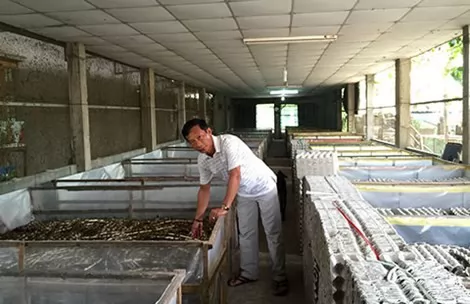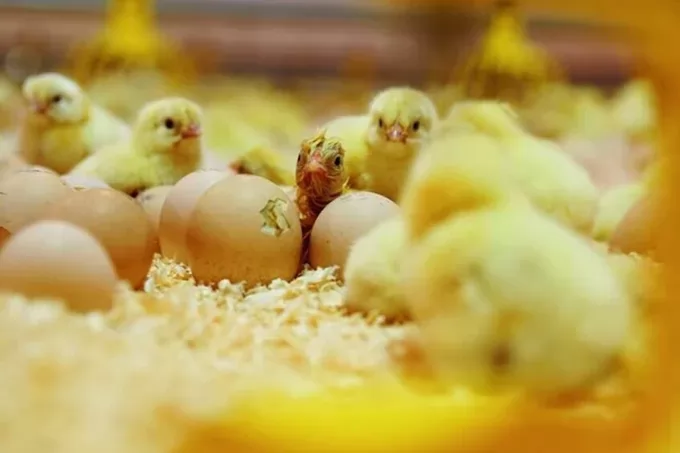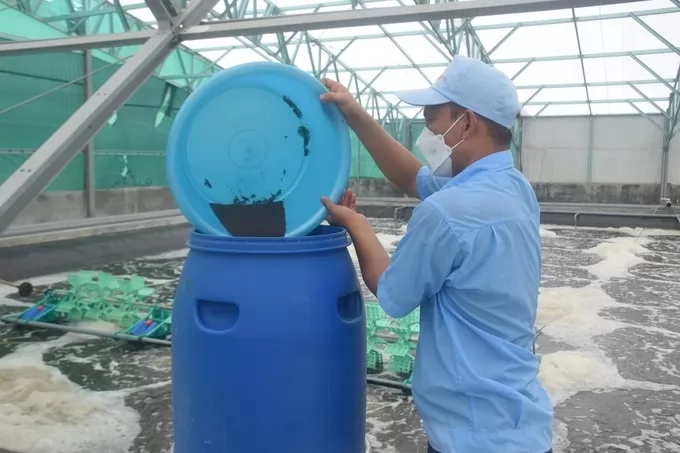Vietnamese man makes fortune breeding ducks

Le Ngoc Moi is seen holding and checking on a duck.
A Vietnamese man has developed a duck breeding business into an enterprise worth roughly VND10 billion (US$ 441,287) from crippling debts over nearly four decades.
Le Ngoc Moi, or Ut Moi, 53, is now looked up to by many of his Thap Muoi District neighbors in the Mekong Delta province of Dong Thap.
Raising ducks is generally considered a dead-end, arduous job, particularly with the animal wandering from one province to another and dabbling for food in paddy fields.
“I can’t tell you why I chose this job, nor why I have stuck to it over the past 37 years,” he confided, pointing to the 5,000 birds forming his flock.
“My children have tried to get me to quit, but I’ll keep doing it until my last breath,” he added.
Coming from a poor background, he began eking out a living with menial, seasonal work as early as 15 or 16 years old.
However, the small-statured teenager soon found himself out of a job.
At 16, Moi borrowed money to buy ducklings and tended to his 500-bird herd on his own. His fowls would scavenge for leftover husked rice after crop harvests, which saved him money on duck feed.
Moi revealed some of the immense difficulties in keeping wandering ducks, including walking long distances with heavy equipment on his back, drifting in and out of sleep in a hammock next to the paddy field his birds were feeding on, and making do with only very meager, fast meals.
“I lost dozens of ducks to thieves or thugs who just grabbed my birds before my very eyes,” he recalled.
“It pained me when no one bought my ducks or did so at dirt-cheap prices despite the fact that they were of good size and quality.”
The nomadic nature of the job meant Moi has spent time all over the southern provinces.
He recalled his most desperate time at the age of 24.
The young man was at that time herding his flock near the Cambodia-border district of Vinh Hung in Long An Province, also in the Mekong Delta.
Though traders offered him extremely cheap prices, he had no choice but to sell his fowls.
It was then that Moi contemplated suicide out of despair.
At 27, he married a girl and the couple roamed other provinces to keep their ducks’ stomachs full and to avoid debt collectors as well. At first Moi trusted his elder sister with looking after their eldest son, but soon took the boy back.
With his wife staying home to care for their two sons, Moi was constantly on the move and did not see his family for half a year or even a full year.
Life-changing switch
At the age of almost 30, Moi decided to switch from raising ducks for their meat to keeping them for breeding purposes.
The man’s first-ever batch of 1,000 ducks followed him to Kien Giang, Bac Lieu, Long An, and An Giang Provinces.

Le Ngoc Moi (L) stands next to his water reservoir and duck feed tank which are under construction. Photo: Tuoi Tre
He then started pocketing good earnings, which he used to buy more young ducks, expanding his flock to between four and five thousand individuals later.
“There were times when the birds laid thousands of eggs each night, earning me enough money for some taels of gold [a tael is worth approximately VND33 million ($1,517)],” he disclosed.
The veteran farmer soon needed to hire others to work for him during those times when his flock grew to 20,000 head of duck.
Only when Moi paid off his debts did he return home and reunite with his wife and children.
Now earning good profits from the job, Moi considered purchasing land to expand his business.
Once he turned 35, his purchase of the first plot of land, measuring one hectare, for 12 taels astounded locals.
Thanks to Moi’s 15 years of experience in keeping wandering ducks, his herd is now less prone to diseases and lays good eggs.
The nouveau-riche man went on to buy more paddy land, though plots were overpriced at up to 18 taels per hectare by opportunistic brokers.
Two out of his three children have now followed in their father’s footsteps in raising reproductive ducks.
Despite his success, Moi and his family still stay in a modest house built years ago.
The VND billionaire still wades through paddy fields on a daily basis to collect eggs from his ducks, though now he has some hired hands.
Innovative approach
Following a successful pilot launch, Moi gave up his practice of keeping poultry free range and switched to confined farming late last year.
“The approach is more effective and allows farmers to stay home and take better care of their children instead of wandering from place to place for days or even months,” he explained.
Local agricultural and animal health officers considered Moi’s method a breakthrough in duck farming for being labor-effective, facilitating vaccination, and containing epidemics.
He was urged to establish and run Dong Thap Province’s first-ever duck raising cooperative and pass on his expertise to fellow farmers.
He agreed without any hesitation.
Founded in early 2016, Thap Muoi Duck Raising Cooperative has attracted 13 households in several communes throughout Thap Muoi District.
Moi revealed that the co-op is supplied with antibiotic-free duck feed from a company based in Sa Dec, a city in Dong Thap, while another in the neighboring province of Vinh Long provides daily outlets for eggs.
The collective also receives vaccine assistance from the government, while banks offer low-interest loans for infrastructural development.
Le Thanh Tam and Le Van Hoa, who joined the cooperative at its outset, have also thrived on Moi’s wholehearted technical assistance and experience.
“I wish to replace the old saying that ‘one raises ducks only to get poor’ with ‘one raises ducks properly to get rich,” Moi said.
Tuoi Tre News
Maybe you are interested

Breeding insects for export, a new industry for VN
VietNamNet Bridge - The most difficult procedures in insect export is asking for the certificate of quality, size and the certificate of origin for insects.

On-farm hatching - a growing trend in the US and Canada
Hatching your chicks in your own poultry house rather than having them delivered is a concept that's popular in Europe and is now gaining some traction in the US and Canada.

Binh Dinh approves the policy to invest in shrimp hi-tech agricultural zone
(VAN) The total investment of Hi-tech Agricultural Park for Shrimp Development Project in My Thanh commune (Phu My district, Binh Dinh) is over VND 1,498 billion.





